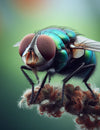
Organic farming is a system that leads to sustain the soil health, environment and people. Organic agriculture follows the innovation, tradition, and science benefits for betterment of everything and everyone involves in it.
Organic agriculture based on the IPM technology that minimizes the environmental impact. Organic farming benefits the ecosystem includes the soil fertility and environment.
When we are choosing organic farming pest management is always a concern. Pest management is done by using biological control, natural or organic pesticide. For weed control (common problem of farmers, gardeners) is done by using cultural control.
Let dig into to know about pest management in organic farming in detail.
Pest management in organic farming
The goal of pest management organically is limit or end the pest infestation from field without harming the crop, plant or ecosystem or environment. Some disease and pest limit the use of resources. So this is very important to choose the method that right choice for your crop.
The successful IPM (Integrated Pest Management) program or the four principal that organic farming pest management based on is prevention, avoidance, monitoring, and suppression.
Organic farming v/s conventional farming

Organic farming and conventional farming possess different product use, many different methods. Different pesticides are used in organic and conventional farming. Let’s know about the difference between both.
|
Organic farming |
Conventional farming |
|
Synthetic fertilizers and pesticides are not allowed to use. |
Synthetic fertilizers and pesticides are being used. |
|
Genetically modified organisms are not used in organic farming. |
Genetically modified organisms are allowed to use. |
|
Organic farming is more sustainable. |
Conventional farming is less sustainable that organic farming. |
|
Water holding power of soil is more in organic farming. |
In conventional farming soil can hold less water. |
|
In organic farming crop protection is totally based on soil fertility, biodiversity, and crop cycle. |
In conventional farming synthetic pesticide are used for crop protection. |
Crop protection and identification of pests in organic farming
Crop protection is work as the master step whereas pest identification is the slave step. To protect the crop we need to find out about pest, insect, and their natural enemies.
Monitoring of field, pest, and damage pest or insect cause on regular basis can act as a key term in pest identification. It can also work as early detection of the problem that will come in near future.
Integrated Pest Management (IPM)

IPM is a method of terminating the pest problem using different methods. Integrated Pest Management wields methods like cultural control, biological control, physical control, or mechanical control to terminate pests.
Sometimes multiple methods are being used in a group to control pest, insect problems.
Read more about IPM “What are some pest control methods?”
You may like “What is organic pest control?”
Selection of products
The selection of the chemicals or substances you are going to use against pests is an important factor. What you choose will affect the crop, ecosystem, environment, and many other factors as well.
For organic farming, you must not select something with a synthetically made product. Instead, you can choose some other plant-based chemicals if necessary.
Pest monitoring
Why monitoring is important we have already discussed that. Which methods can help us in monitoring? Visual observation plays a vital role when it comes to monitoring. You can also use light traps, sticky traps, water traps, yellow traps, and sweep nets to monitor pests and insects.
Impact of organic farming on the environment
Pest management in organic farming is mostly depending on biological control. No synthetic chemicals are used for pest management in organic farming.
Organic farming is known to have a positive impact on the environment. It enhances the biodiversity of the ecosystem.




Do you have research in soybean?